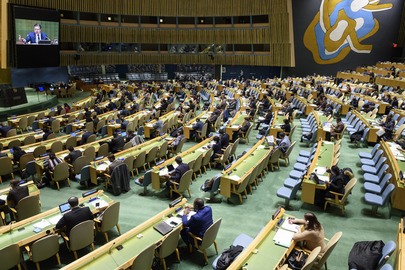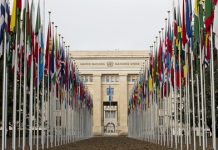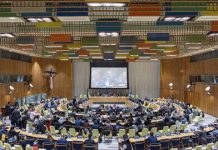UNDP and UNHCR launch joint program to aid war-affected civilians in Ukraine
The UN Development Programme (UNDP) and the UN refugee agency, UNHCR, joined forces on Thursday and launched the Mine Action and IDP Return in Southern Ukraine” – a project designed to “facilitate the rehabilitation and recovery of war-affected communities in Ukraine.”
The programme, set to run through August 2025, will focus on returning internally displaced and war-affected people to their homes in communities severely impacted by Russia’s full-scale invasion by recovering and rebuilding their homes.
The collaborative project will also concentrate on strengthening the ability of public and civil society actors offering legal and protection services, specifically in the Mykolaiv and Kherson regions.
With a budget of $4.9 million, UNDP will focus on the removal of debris and remnants of war, physical and mental health and vocational training, and building the capacities of providers of legal aid. UNHCR in turn will prioritise providing legal assistance to aid war-affected civilians with accessing their rights, restoring destroyed Government documents and more.
This joint programme “aligns with the priorities of the Government of Ukraine and the [UN] transitional framework for early recovery.”
Both UN agencies are committed to supporting the Ukrainian government to aid those affected by the ongoing war there.
WHO elevates Mpox response as cases rise in the African region
The World Health Organization (WHO) has increased response to the Mpox outbreak as cases of the virus in the African region have surged since the beginning of 2024.
Mpox. formerly known as monkeypox, is an infectious viral disease that causes painful rashes, enlarged lymph nodes and fever, among other symptoms.
The Director-General of WHO, Tedros Adhanom Ghebreyesus, has called an emergency meeting for a committee of experts to decide whether the outbreak will be considered a “Public Health Emergency of International Concern.”
WHO said that 15 African countries are currently dealing with Mpox outbreaks. A total of 2,030 cases have been confirmed and 13 people have died from the virus this year, so far. Burundi, Kenya, Rwanda and Uganda, which previously had zero reported cases, now have confirmed cases as of mid-July.
A new variant of the virus has also been reported in the Democratic Republic of the Congo, Kenya, Rwanda and Uganda.
WHO is working with partners at global, regional and local levels to enhance response to the outbreak and has deployed experts on the ground to support national authorities.
The health organization is working on enhancing contact tracing and is “mobilizing financial support to help countries effectively respond to the outbreak.”
Heavy rainfall in Yemen kills 30, WHO provides humanitarian care
WHO also reported on Thursday that 30 people died and five people are missing following heavy rainfall on Tuesday night in Hodeida, Yemen. The figures of those missing and deceased are not yet final.
The rainfall caused damage to infrastructure, including hospitals and health centres, displaced several people and even reportedly completely washed away a village. Power and water supplies were also affected.
WHO Representative Dr. Arturo Pesigan said the flood’s destruction will increase the challenges for communities already impacted by conflict.
“Urgent action is needed to address immediate humanitarian needs and the long-term consequences of climate change in the country,” he said.
WHO are monitoring the situation and working with local health authorities to provide emergency health kits and other medical supplies to Hodeida, which currently hosts about 60,000 internally displaced people.
WMO says extreme levels of heat continued through July
And finally, the World Meteorological Organization (WMO) announced on Thursday that extreme heat continued through July, which was the second warmest month globally.
22 July 2024 was globally the hottest day of the year.
The organization says they are committed to responding to the UN Chief’s Call to Action, launched in July, by establishing “better heat-health early warnings and action plans.”
WMO Secretary-General Celeste Saulo said recent estimates show that a global scale-up of heat health-warning systems for 57 countries can potentially save 98,000 lives per year.
Ms. Saulo said in addition to climate adaptation, there needs to be a global reduction of greenhouse gas emissions to tackle the root cause of the heat.
Music composed and produced by Joachim Harris. All rights reserved
Source of original article: United Nations (news.un.org). Photo credit: UN. The content of this article does not necessarily reflect the views or opinion of Global Diaspora News (www.globaldiasporanews.com).
To submit your press release: (https://www.globaldiasporanews.com/pr).
To advertise on Global Diaspora News: (www.globaldiasporanews.com/ads).
Sign up to Global Diaspora News newsletter (https://www.globaldiasporanews.com/newsletter/) to start receiving updates and opportunities directly in your email inbox for free.































